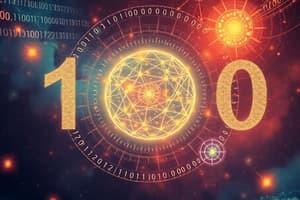Podcast
Questions and Answers
How many digits are there in the hexadecimal system?
How many digits are there in the hexadecimal system?
- Fifteen
- Ten
- Sixteen (correct)
- Twenty
What do the letters A-F represent in the hexadecimal system?
What do the letters A-F represent in the hexadecimal system?
- Values from 0 to 5
- Values from 11 to 16
- Values from 1 to 6
- Values from 10 to 15 (correct)
Which number system is known for simplifying complex numbers in a compact form?
Which number system is known for simplifying complex numbers in a compact form?
- Decimal system
- Hexadecimal system (correct)
- Octal system
- Binary system
What power does each digit in the hexadecimal number represent?
What power does each digit in the hexadecimal number represent?
Why are hexadecimal numbers often used in programming languages and computer architecture?
Why are hexadecimal numbers often used in programming languages and computer architecture?
What is the base of the most widely used number system globally?
What is the base of the most widely used number system globally?
How many digits are there in the decimal number system?
How many digits are there in the decimal number system?
In the binary number system, what does each digit represent?
In the binary number system, what does each digit represent?
What is the base of the binary number system?
What is the base of the binary number system?
Which number system uses symbols 0 and 1?
Which number system uses symbols 0 and 1?
How many place values does the decimal number system have?
How many place values does the decimal number system have?
Study Notes
Chapter 1: Understanding Number Systems
Number systems are fundamental structures used to represent numbers and perform arithmetic operations. They consist of sets of symbols, known as digits, arranged in specific bases that define the system's properties. The most commonly used number systems are decimal, binary, and hexadecimal. In this chapter, we will explore these number systems and their implications on mathematical operations and computational systems.
Decimal Number System
The decimal number system, also known as base 10, is the most widely used number system globally. It consists of ten digits: 0, 1, 2, 3, 4, 5, 6, 7, 8, and 9. The place value of each digit depends on its position within the number. For instance, the ones place represents numbers between 0 and 9, while the tens place represents numbers between 0 and 90, and so forth. This system allows us to perform arithmetic operations such as addition, subtraction, multiplication, and division easily.
Binary Number System
Binary number system, or base 2, is the foundation for digital computers and other electronic devices. It uses only two symbols: 0 and 1. Each digit in the binary number represents a power of two. The leftmost bit is 2^0, followed by 2^1, then 2^2, and so on. To convert a binary number to decimal form, we calculate the weighted sum of each power of 2 multiplied by its respective digit value.
Hexadecimal Number System
The hexadecimal system, or base 16, is another commonly used number system in computing. Instead of having ten digits like the decimal system, it has sixteen digits. These are the standard numerals 0 through 9, along with six letters A through F representing values from 10 to 15. Similar to the binary system, each digit in the hexadecimal number represents a power of 16. Hexadecimal numbers are often used in programming languages and computer architecture because they simplify the representation of complex numbers in a compact form.
In summary, understanding number systems is crucial for various applications in mathematics, engineering, and science. Each system offers unique properties that make them suitable for different purposes. The decimal system is universally understood, the binary system powers modern technology, and the hexadecimal system streamlines complex computations.
Studying That Suits You
Use AI to generate personalized quizzes and flashcards to suit your learning preferences.
Description
Test your knowledge on decimal, binary, and hexadecimal number systems with this quiz. Explore the properties, conversions, and applications of each system in mathematics, engineering, and computer science.



